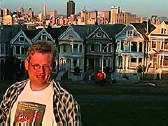“Why (is) being gay like being a member of a religious cult, except not so open-minded?”
This note on the inside cover was almost enough in itself to make me buy this book. It’s rare that I run into a book that I want to make everyone read — rarer still that it should be of the “queer theory” variety. And it’s down right unlikely that a book like this should appear to me by accident right when I’m most looking for it. But here it is: “Anti-Gay”, a collection of essays edited by Mark Simpson (Freedom Editions, UK, 1996; ISBN 0-304-33144-9) gave me shivers, and had that rare quality of saying very coherently too many things I’ve been thinking of late. Ten thought-provoking essays for only $16.95.
A basis premise is that so-called “gay culture” in the 1990’s has become a bland mishmash of upper middle class stereotypes perpetuated by the commercial media (The Advocate, Out, Genre, etc.). Queers have been fed so much commercialized “pride” imagery and “gay is good” dogma that we have settled for a homogenized culture of mediocrity. We have, it is suggested, been far too willing to judge music, art, and culture more on the basis of its gay statement or context than by its actual artistic or cultural merits in a larger sense. Hence, we accept the one-sided and limited perspective of the Advocate as good news reporting, claim that the music of the Pet Shop Boys and Erasure is the fullest expression of our culture, and truly believe that films like “Longtime Companion” are great art, simply because they have a “pro-gay” perspective.
Obviously, there’s more (or I wouldn’t be so excited…) The essayists take on many aspects of the dogma that queers have been force-fed in the post-Stonewall era and dare to suggest that all things gay are NOT inherently good. A running theme is that by assuming that as “liberated gay individuals”, we allow ourselves to believe that all evil which befalls our community is due to external forces. We thus become unable to accept any responsibility for our own actions.
And even “community” is a misleading term. What about those a who do not fit the “majority” image of settled middle-class homeowners driven by consumer culture? What about punks, street people, low-paid service workers, closeted individuals living in North Dakota, etc.? Not everyone is willing to be drawn into the “one world culture” of Genre Magazine, with its gym memberships, Macy’s charge cards, drug-driven dance clubs, and freedom rings. In order to make gay people more palatable to the conservative majority, we have marginalized anyone who doen’t “fit” comfortably.
I really liked this book; it makes points which too many queers have been afraid to make in recent years. People will read these essays and be extrememly pissed off. I have my disagreements with certain of the pronouncements, but the whole point is disagreement and the promotion of discourse, as well as the challenging of 90’s “gayspeak”. “Anti-Gay” most definitely succeeds.
Some Excerpts:
Mark Simpson:
As a measure of how successful and how popular gay is, every year the parades get bigger, the floats fluffier, and the male strippers beefier and oilier. In case we don’t notice this, the gay press carefully points this out — along with the cast-iron prediction that this year the parade will be so big, fluffy, and oily that the straights won’t be able to ignore it, like they somehow managed to last year…But perhaps the most encouraging thing about the rising attendance figures is that they bring ever closer the realization of the greatest gay dream of all: to turn the whole world into a gay disco!
…And what better image of freedom and love could there be than the gay disco? With just a teensy-weensy bit of help from mind-altering substances, the gay disco is the place where you can experience the most intense sense of well-being, belonging and happiness, not to mention some really interesting conversations about life, the universe and how difficult it is to get hold of good shit these days and how the tab you took last week turned the whites of your eyes yellow.
In the gay world, everything is reassuringly similar wherever you go. Gays are better at franchising than McDonald’s. Just in case you should feel homesick when traveling abroad or just around town, gay bars and clubs around the globe are plying the same music and the patrons are wearing the same jeans, haircuts, and even facial expressions…And wherever you go you can pick up a gay publication which is full of pictures of other people just like you and exiting information on just how many people there are just like you out there and how you can meet them. Once you’re out you need never be troubled by pesky old difference again.
John Weir:
The entire gay male community seems at times to be colluding against the possibility of independent thinking. The gay rights movement, too often, is focused on theatrics rather than discourse: we want to be entertained and flattered, not criticized. As a group, self-identified gay men are especially resistant to thinking about issues of class and race, and they steadfastly deny their sexism. The irony of gay liberation is that it has made room in the mainstream only for those white men who are already privileged, and disinclined to share their wealth.
Effectively, there is currently no more identifiable type than the self-identified, politically active, sexually predatory gay American man, the kind of gut who wants, not equality for everyone, but entitlement for himself. And big pecs. If gay men ruled the world, there would be tax credits for joining a gym. this was abundantly clear to me at the New York Stonewall 25 celebration…It was a week-long festival of pod people twirling their multi-colored freedom rings. there were so many hairless young men in nipple-hugging white T-shirts wandering the streets, that I began to wish it was 1969 again and the paddy wagons would come and take them all away.
Peter Tatchell:
Moderate accommodationist gay rights politics is, ironically, solely concerned with winning rights for homosexuals. It offers nothing to heterosexual people. Whereas strident, anti-assimilationist queer activists seek the extension of sexual freedom in ways that ultimately benefit everyone. The radical queer activists who are so often derided as separatists are, on the contrary, the proponents of a form of sexual liberation that is, in the end, more in tune with the common interests of gays, straights, and bisexuals than any purely gay rights agenda could ever be.
Lisa Power:
To put it plainly, I am sick of lesbian and gay people, especially those involved in political or social activism, who act as a photographic negative of the heterosexual society from which they have escaped and who do not adhere to the rigid sexual boundaries and rules they, in turn, prescribe. I am sick of seeing honesty punished and repression rewarded. I am sick of seeing people who feel forced to censor themselves or to live in two separate worlds. I am sick of seeing people who really don’t like themselves because they have swallowed the lie that their personal complexities and idiosyncrasies make them Not A Real Lesbian/Gay Man, or at least a second-class one.
Paul Burston:
Traditionally, two assumptions have shaped the way in which films are reviewed by the popular gay press. The first — that films made by gay people for gay people are somehow above criticism — is, thankfully, going out of fashion. Years of sitting through the most appalling rubbish, and feeling obliged to applaud the filmmakers efforts have clearly taken their toll…
The second — that films made for a mass audience are automatically suspect when it comes to representations of lesbians and gay men — still holds true for a significant number of gay film critics…(T)he bulk of what we refer to as ‘gay film criticism’ still starts from the premise that what matters most is not what the film in question contributes to the art of cinema or what pleasures it might hold for a queer-literate audience, but the degree to which it explicitly serves the gay political cause…not ‘does the character have an important or entertaining part to play in the shaping of the plot?’ but “is this character setting a good example?’.
Toby Manning:
Another given of gay culture is righteousness. Self-righteousness is perhaps an inevitable by-product of liberation movements, but gay righteousness is particularly offensive in its ability to be simultaneously apologetic and self-aggrandizing. Apologetic because it doesn’t challenge the structures of society, it simply says ‘straights are being horrid to us’…Self-aggrandizing because the mantra of oppression drowns out all else in its repetition, including an indignation out of proportion to the issue…
(T)heir constant, unquestioning invocation makes for dull, lazy speeches at Gay Pride festivals (of the “I am a one-legged lesbian from Lithuania’ variety); unanalytical, unobjective news reporting (…the respect given AIDS closet cases Freddie Mercury and Rock Hudson); sentimental songs that operate a kind of community thought-bypass (like those of Holly Near or Michael Callen at the Gay Games); and bland films (“Philadelphia”, “Parting Glances”, “Longtime Companion” all busily pushing the AIDS button). But these emotional response buttons are carefully chosen to keep the issues as mainstream as possible. Little righteous anger is heard on behalf of transsexuals or SM dykes. Anything that doesn’t fit the righteous reformist agenda is kept out of sight, ignored by the gay press and by gay political organizations — after all, if it’s not wholesome and easily understood, heterosexuals (read ‘powerful conservative figures’) might be scared off.
The collapse of Queer Nation is often taken as an example of the failure of queer/transgression as a whole, though the organization in fact had no connection to the queerzine ethos, simply appropriating the tern ‘queer’ for what was essentially just a more militant take on the usual gay reformist agenda. The extent of the organization’s separation from real queer culture is illustrated by their sending a death threat to Denis Cooper, a hero to queer zinesters. But it was this movement that came to represent queer in the popular imagination, the result being, as Bruce LaBruce has pointed out, that ‘the Queer nation sensibility and aesthetic merged with what (zinesters) were doing and watered it down.’ Unlike the queer zinesters wholesale rejection of society, the new militancy was easily assimilable into gay culture…
Meanwhile, many of the visible signifiers of queer (nipple rings, tattoos, and punk styles) were taken on by gays as fashion accessories, and thus stripped of their original meaning. Hardly surprising that ‘queer’ has come to suggest a pierced-nippled, brain-dead, club-crazy bimbo wiggling his hips to house music.


